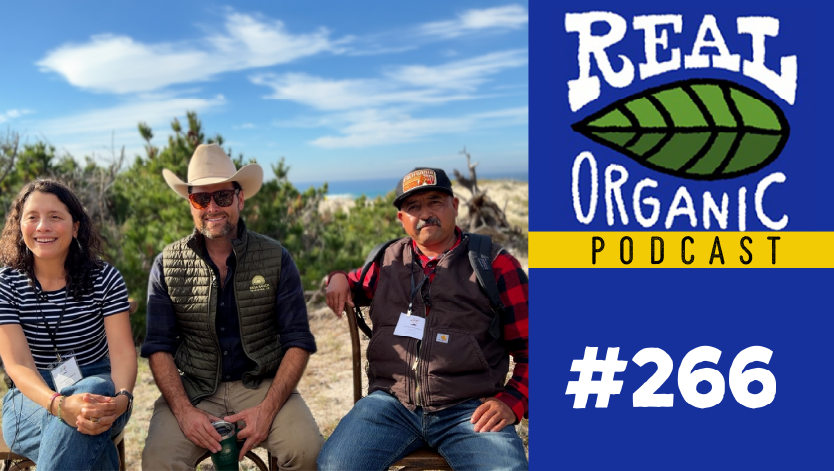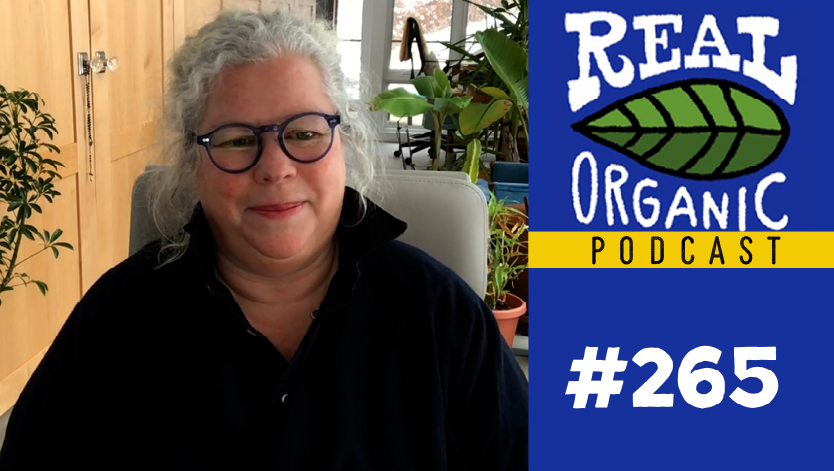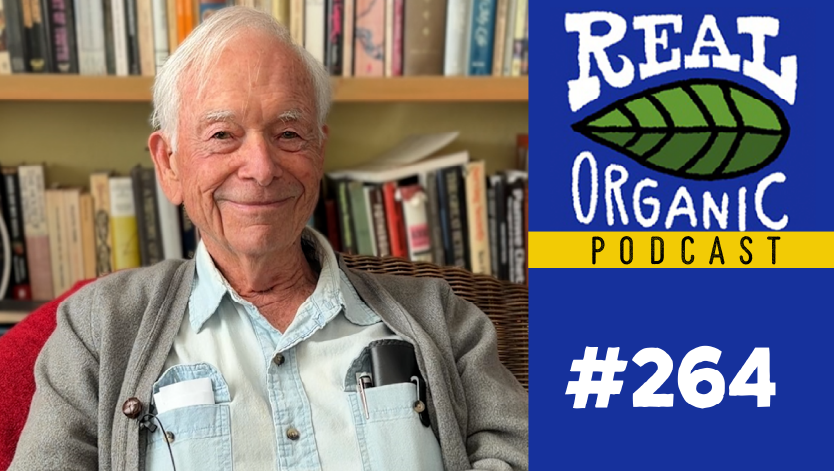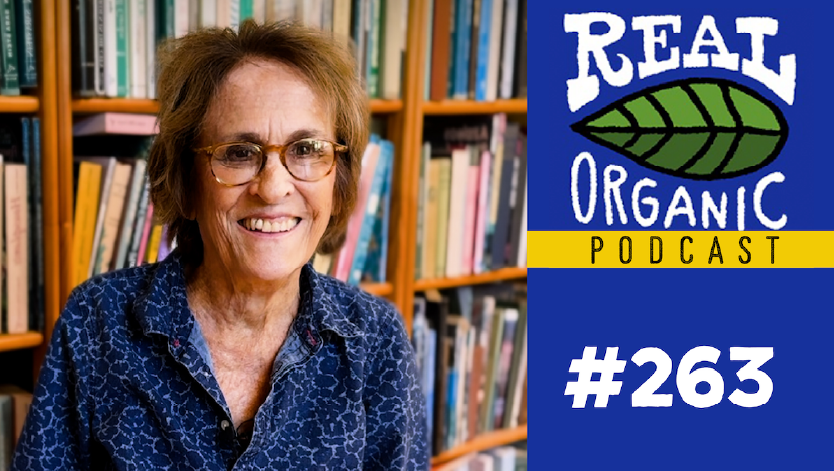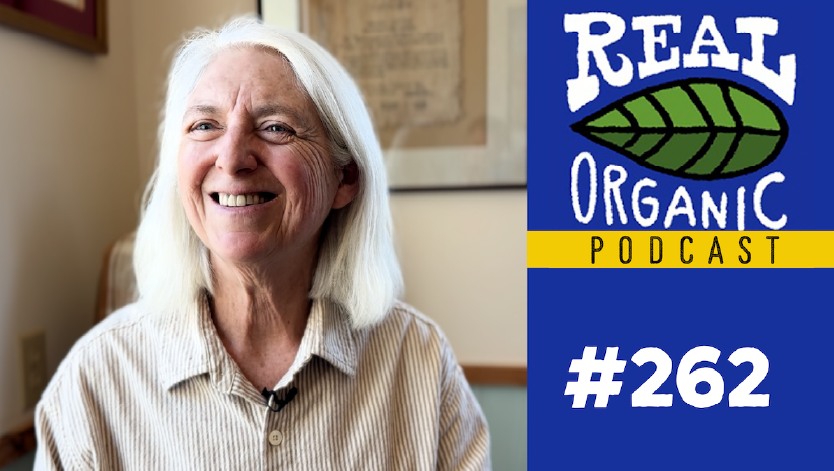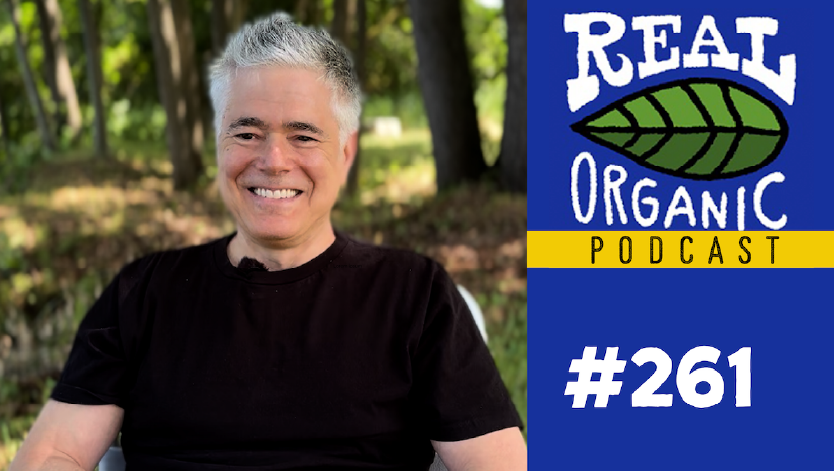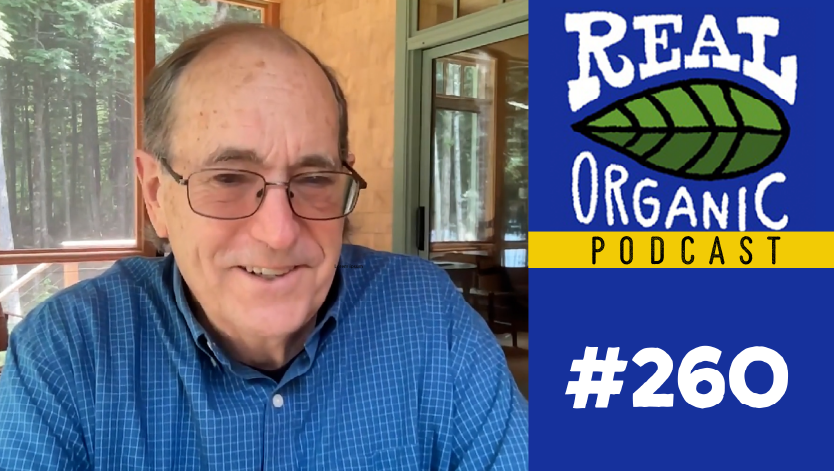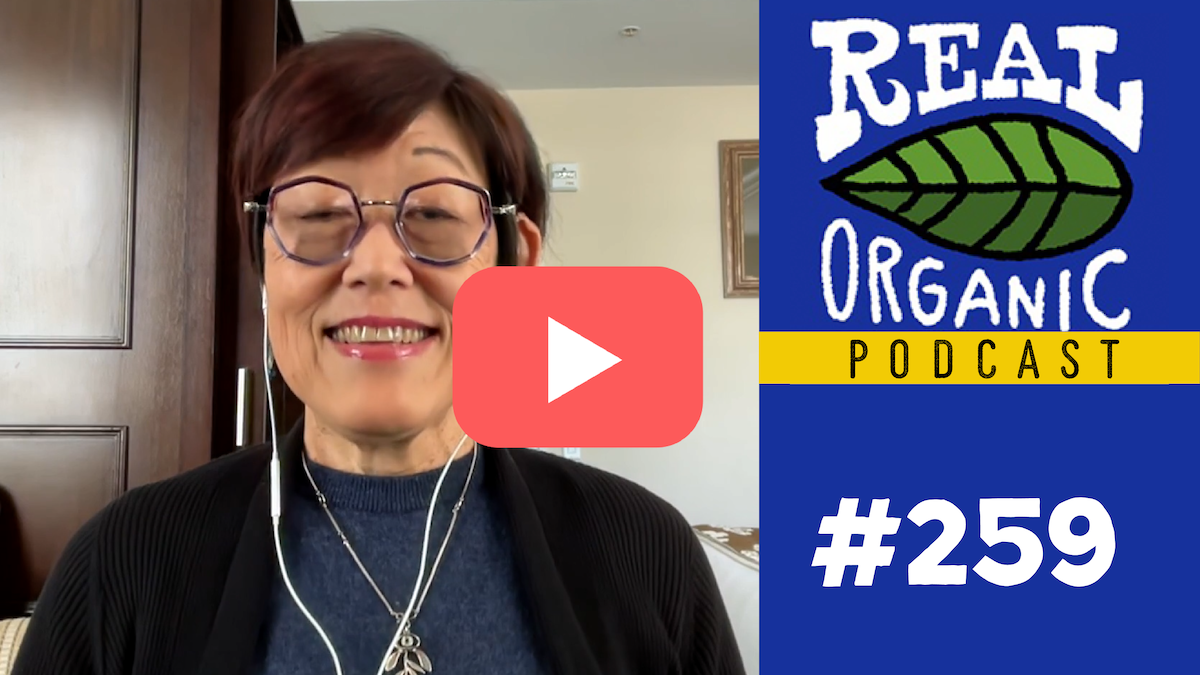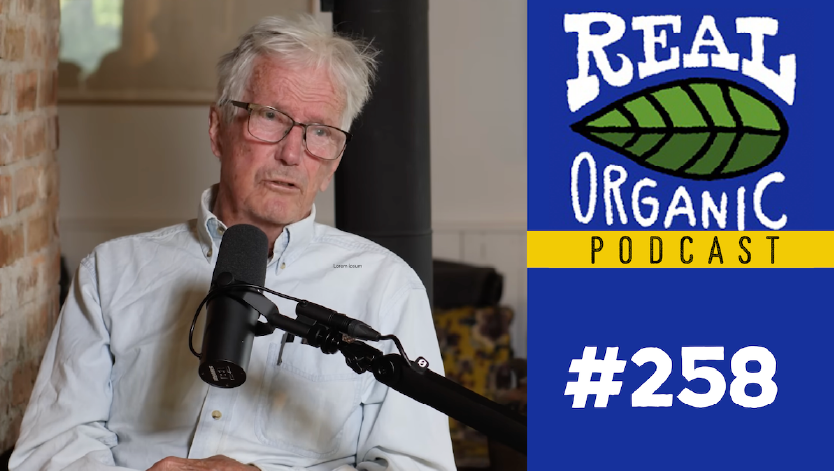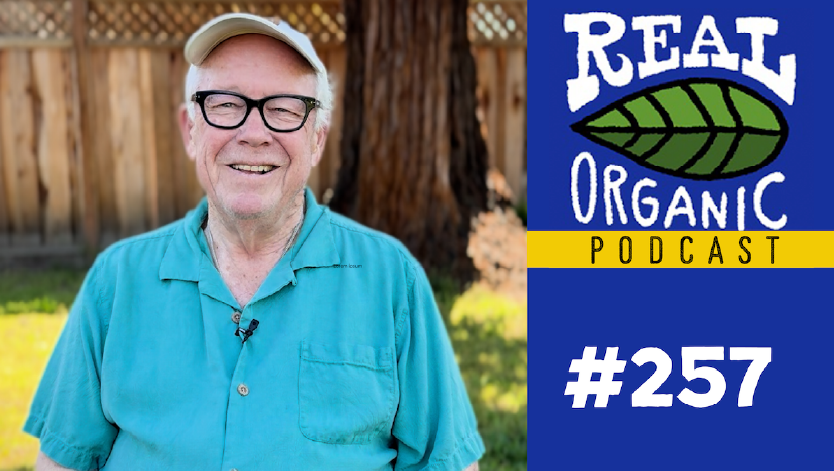Episode #005
Al Gore: Climate, Agriculture, + Human Migration
Welcome! You can subscribe and download episodes of our show through your favorite podcast app.
You can also subscribe to receive the video version of each episode on our YouTube channel.
Our Al Gore interview has been edited and condensed for clarity.
This interview has been edited and condensed for clarity.
Dave Chapman: Welcome to the Real Organic Podcast. And we are very honored today to be talking with Al Gore, former vice president and winner of the Nobel Peace Prize. Welcome Mr. Gore.
Al Gore: Thank you for having me. I’ve been looking forward to it.
Dave Chapman: Well, thank you for joining us today. I got to tell you that getting ready for this I took it upon myself to watch an Inconvenient Sequel last night again, and it’s interesting. We’ve been planning, as we’re always working on reducing energy on our farm. We’ve been working on a heat pump project that involves a half acre solar array. That would be in my backyard and my wife was not totally enthusiastic. And at the end of an Inconvenient Sequel, as the credits were running, she turned to me and said, “we should build the solar array.”
Al Gore: Oh, well, great, great.
Dave Chapman: That’s right. Change is created by telling stories and showing people what’s going on. So thank you. I’m going to turn it over to Dr. Linley Dickson, my co-director for the first question.
Linley Dixon: Hi, Mr. Gore. It’s truly an honor. So earlier I had the pleasure of interviewing your farm manager at Caney Fork Farms, Mr. Zach Wolf. And I’m curious, because I’ve noticed that you happen to be a fairly busy man and we’re farmers ourselves, and know that it takes a lot of work. Why did you choose to revive your family’s land into a productive farm? And why did you choose to go organic?
Al Gore: Well, I grew up every summer on this farm. It’s my home and it’s just not the same if you have a farm that’s not being farmed. And because I have worked on the Climate issue for so many decades, when I finally got to the stage of my life where I moved out of Washington DC and back home, I knew right away that I wanted to farm in the best, most-ecologically responsible way.
And since I’ve had some background in business since 2001, I decided to prove the business case, or to try to prove the business case that organic and regenerative farming is a good business proposition if you go about it in the right way. And that’s important to me because I want this to be a model of sorts. So that if my neighbors see it being successful, as well as promoting a better contributing, to a better future and promoting the right future then the idea might spread. And of course, many others have been doing it long before I was and I’ve learned from them, but I wanted to pay it forward.
Linley Dixon: We became connected because Caney Fork Farms is certified with the Real Organic Project. I’m wondering why you chose to sign up for the Real Organic Project?
Al Gore: Well, I, I decided to sign up Caney Fork Farms for the Real Organic Project after talking at length with my farm manager Zach Wolf, and learning a good deal more about the way in which the USDA organic label has drifted away from what the standards for organic originally were intended to be.
And maybe we’ll have time to talk about that some, but I wanted to follow an organic standard that respected the soil health because that’s really the heart of it. And getting out of the artificial chemicals and the synthetic this and synthetic that, that’s one thing; but doing it in a way that promoted soil health, along with the other factors important to ecological integrity and health, that was important to me and still is.
Dave Chapman: So you’ve, you’ve organized an annual meeting at your ranch called The Climate Underground. And a [Real Organic Project] board member Francis Thicke was one of your panelists last year. And that’s when I first heard about it. And I was very impressed and I attended this year when it was virtual. Why did you do that? What is that gathering about?
Al Gore: Well, it’s a way to learn, a way for me to learn and for our farm team here to learn, but also to participate with others who are looking for the best new practices that can speed the transition away from the dependence on chemical agriculture and heavy tilling and soil erosion and all of that. And also it’s a way to connect agriculture to solutions for the Climate Crisis.
I have worked very hard for decades looking for solutions to the Climate Crisis and looking for ways to spread the greater of this existential threat. And long since then, I learned that agriculture shouldn’t be defined as simply a contributor to the problem; it’s one of the most important contributors to the solutions and in order to promote the success stories that I’ve found around this country and elsewhere I wanted to have an annual gathering to, to celebrate the good news and to learn from others, as I said before, and to have the kind of interactive knowledge transfer that could give more momentum to this movement that so many of us are a part of.
Dave Chapman: Yes, it seems like a fairly recent addition to the Climate Change movement to really embrace the role that agriculture must play in that. Would you agree with that?
Al Gore: Yes, I agree with it. Actually it’s like a lot of things in climate science, if you go back and look for when a particular insight first appeared and when more people began to talk about it, this actually goes back quite a ways. But I mean, I wrote a book quite a few years ago called Our Choice: A Plan To Solve The Climate Crisis that really focused on organic carbon in soils as part of the solution to the Climate Crisis.
But I think you’re right, that it’s been relatively recently that we have reached the beginnings of a critical mass of people who really have tuned into this. You know, people focus on growing trees and that’s awfully important, and silvopasture is a big part of what we do here also, but there is more than three times as much carbon in the topsoils of the world, as in all of the 4 trillion trees on Earth, plus all of the other vegetation combined.
There’s twice as much carbon in the top soils as is in the atmosphere already causing the Climate Crisis and the scientists, one of whom, by the way, I’ll single out: professor Rattan Lal at Ohio state. He’s been a long time friend and mentor to me.
They have pointed out the, the findings from the scientific research that tell us that the topsoils could absorb much more carbon and in the process become more fertile and productive. So it’s a kind of a classic win-win situation if we can make our soils healthier and more fertile and at the same time pull some of the excess carbon out of the atmosphere. Then that’s as close to a win-win, as you’ll find.
Now, there are some methods of speeding up this transition that I’ve also wanted to talk about in these annual conferences. And one of them is to create a system for measuring and verifying with audits and good science, and all the rest measuring the buildup of organic carbon in soils in order to have enough verifiability so that they would qualify to participate in the growing carbon credits market around the world.
And trees have played a big role in that already, and owners of big, good stands of trees. Sometimes if they go through the process the right way, they get checks in the mail for keeping those trees standing and pledging not to cut them down. And protecting them well, since there’s more than three times as much potential already for the sequence duration of carbon and soils.
If we can get an accepted, scientifically valid, verifiable way to track and measure the buildup of carbon in soils, that could be an extra revenue stream for those farmers who decide to make the kind of transition that we’ve made here at Caney Fork Farms and switch over to Real Organic and regenerative farming.
Dave Chapman: Yes, absolutely. You know, one of the tragedies, or it’s a tragedy and an opportunity at the same time, that we see is that the demand for organic in the marketplace is growing and growing. It’s wonderful. It’s past $50 billion and it’s growing quickly and people are turning to it, they’re voting with their dollars.
The problem is of course, that a lot of the time they’re not getting what we would call Real Organic. And I see that the barriers to change here are mostly not in terms of agriculture. They’re mostly not technical in terms of, we need to invent a new kind of solar array. They’re really about politics and economics, and how do we make food available and build the market so it’ll grow.
In Europe, they’ve made a commitment in the EU to go 30% organic, I think, or 25% organic by 2030, which would be a huge shift. And they are definitely talking about Real Organic. Do you think that’s possible here?
Al Gore: Oh, I do think it’s possible. I’m by nature an optimist, so you have to take that into account when I answer you that way, but I do think it’s possible. Definitely. I think the awareness of the Climate Crisis, the awareness that healthy food is essential to have a healthy body and a healthy life. Those two things have converged to stimulate a lot more attention particularly during this pandemic.
And I’m sure it’ll remain true. When we finally vanquish this COVID-19 virus I think that what we’re seeing is people buying more local or buying more organic – paying more attention to what it means to be really organic or Real Organic. And so, yes, I think that’s, that’s very possible.
But you’re right that it’s a question where politics plays a role. And we have a system in our country of representative democracy which was creation of genius by the founders of America two and a half centuries ago almost but we have seen how in recent decades, the impact of big campaign contributions and the enormous lobbying expenditures, and the insistent use of the so-called revolving door with lobbyists coming in to play roles in government, and then making the circuit over and over again.
All of those things have contributed to the weakening of the the true intended meaning of the, the word organic and you have these CAFOs now qualifying for it and egg producers that we wouldn’t really say meet the, the organic standards, hydroponics is another issue involved, but in order to really maximize the transition on farms toward a Real Organic standard, toward regenerative agriculture practices, we need to maximize the number of consumers who are looking for an indication that the food they’re about to purchase really does align with their values and really does meet the standard that that we think it should meet.
And then when we get rid of the counterfeit organic, maybe that’s too harsh, an adjective. I don’t actually think it is, but I understand they have a different point of view, but when we have all of the folks who are looking for Real Organic food able to trust in the, in the labeling, then I think that maximizes our chance to switch over a much larger percentage of farms.
Linley Dixon: It can be really frustrating as a farmer because we know that the kind of farming that we’re all talking about here, Real Organic, regenerative organic, whatever you want to call it, it already exists, but it’s not really being fostered by the system that we’re in because the consumers truly want to support us.
But again, they’re being misled as to what they’re buying. You know, the picture on the carton is the beautiful chicken out on the pasture, but that’s not the reality of where the egg comes from. So we know consumers want to support it, and we know those farms exist, but they’re really struggling right now, particularly in egg production and organic dairy as well. Do you think it’s possible to reform the National Organic Program even though we’ve really struggled under the last two administrations? Or do you think people must pursue the creation of an alternative to the certified organic alternative?
Al Gore: Well I’m not sure it’s an either or; it may be that an alternative standard is a waystation toward the broader reform of the main standard. What I was saying a moment ago about lobbyists and campaign contributors using their influence to chip away at standards, that that is something that we have to deal with in order to really bring the the USDA standard back.
I was vice-president when this organic standard was first put in. I went and looked up the language there, as an expert advisory panel defined the standard this way: as an ecological production management system that promotes and enhances biodiversity, biological cycles and soil biological activity based on minimal use of off-farm inputs and management practices that restore, maintain and enhance ecological harmony. Well that’s good, but that’s been chipped away at, and you have these lobbyists that have been able to come in and make exceptions.
And it’s a little bit like how, when people get angry about big tax loopholes and invariably the wealthy interests that benefit from new tax loopholes are ones that have hired the fancy lawyers and made the expenditures in campaign season, and wine and dine the right people in their process of persuasion, and and you know, over time that has resulted in more power for special interests at the expense of the broad, general public.
And it’s that precise mechanism that has operated to weaken and undermine the national organic standards. So while we’re fighting to get them back where they should be, we may in the meantime, need to follow an alternative standard. And if they fail to respond to us, maybe the alternative standard would get more support and really become the one that matters to more people.
Dave Chapman: Mr. Gore, your talk at the Climate Underground was very good. And you’ve taught me a lot about the impact that Climate Change is having on agriculture around the world, and a lot of new and terrifying information; really things are not going in a good direction.
I also see though, the ways in which agriculture is contributing to Climate Change, and I think that, you know, as we start to fix that, it’s very important. Could you talk about the things that you think are most important that we could change, that we could do differently and how we farm around the world?
Al Gore: Yeah, sure. Well shifting to the low till and no till practices is a no brainer for an awful lot of farmers. Getting away from a dependence on these poisonous chemical inputs, shifting the mindsets away from the, the idea that the only thing that matters is dirt and a seed and chemical inputs and fertilizer toward a mindset that recognizes the reality, which is that all of the life forms in the soil itself are absolutely critical to good regenerative, Real Organic farming.
And you don’t want to kill off all those life forms. You want to enhance them. And in the process, build up soil, organic carbon and build up the diversity of life in the soil below ground and above ground with the pollinators and all the rest.
And I think that when we do that, we reduce the amount of global warming pollution that comes from agriculture. We also reduce the runoff of excess synthetic nitrogen fertilizer that creates the dead zones around the mouth of the Mississippi and every other major estuary in the world. And now these dead zones are appearing out in the deep ocean. So we’ve got the, we’ve got to stop that the algae blooms and great in the great lakes and elsewhere.
So changing our farming practices can not only reduce the contribution of agriculture to the climate crisis, but also can position agriculture to be a significant part of the solution to the climate crisis. Now parenthetically, the solution to Climate Crisis involves first and foremost, reducing the emissions of global warming pollution that we’re putting up there every day.
What you see behind me here is is a picture from the space station showing how thin the Earth’s atmosphere is. We’re using that as an open sewer now, and we’re putting 150 million tons of manmade, global warming pollution into that thin space. And each molecule stays up there on average, about a hundred years and the accumulated amount now traps as much extra heat as would be released by 600,000 Hiroshima class atomic bombs exploding every single day.
And it’s really hard for me and anybody, I guess to get our minds around a number that big, but that’s what’s causing the climate crisis. It’s not complicated. And most of that heat is going into the ocean and with apologies to Las Vegas, it doesn’t stay in the ocean. It comes back out.
And, and that’s the principle reason why we’ve had this enormous increase in the big downpours, like the ones that prevented the planning and 20 million acres in the Midwest a year ago, this past summer contributed to the hurricane-force, derecho wins that destroyed 10 million acres of crops mainly in Iowa this past summer.
We’re seeing these rain bombs and we’re seeing from the same accumulated heat energy, we’re seeing the droughts take place, take hold more quickly and last longer and do more damage to agriculture. Of course, there’s so much else with the melting of ice and the sea level rise. And I won’t get into all of the other consequences. A lot of the scientists are just saying now is “this is a wake up call folks. You, you know we warned you a long time ago.”
The scientists say now we’re getting to the stage where it’s put up or shut up because we cannot continue on this course. And one reason we can’t is that the buildup of the increase in temperatures is hurting yields.
These climate-related extreme weather events, if they take place during planting or harvesting or in between, or through all of that, then it really hurts food production a lot and so much so that the food and agriculture organization and the IPCC, the scientific group that works on climate science have both warned us that the present global food production system is itself in danger of a multi breadbasket failure.
The IPCC said, if we don’t make changes quickly, we could reach the point where our current system no longer can serve an advanced civilization like the one we have. Well you know, what part of that, doesn’t say “Wake up! We gotta change!”?
So you know, I have a tendency to get going on this, and I don’t want to go too long on it, but we have got to recognize this as the principle challenge we face and we need to reframe it as an opportunity, which it really is – for farming to become more profitable and healthier and provide healthier food.
Linley Dixon: Yeah, you’re really talking about broken cycles in nature. So the water cycle’s broken, carbon, nitrogen, you name it. We’re not in touch with what’s actually happening out there. And, you know, I want to say you were ahead of your time, because 20 years ago, I heard you in town hall meeting talk about organic agriculture, organic and local, as part of the solution. And to hear a politician say that, you know, 20 years ago, it was really brave, but you were just listening to the scientists.
Do you believe that we can actually turn the course of Climate Change by replacing old technologies with new technologies, like, you know, solar panels replaces coal, or do we really need to,reinvision the way we live? You know, we interviewed Allan Savory and he talks about holistic thinking, you know, the way our economy is organized, the way we treat each other.. Is there a new vision out there?
Al Gore: Oh, I think there is a, a new way of thinking about our relationship to one another, the importance we place on communities and public goods, like investments in education and healthcare and environmental protection, for sure. And I think there’s a generational shift underway regardless of political party.
You talk to these young people and they talk about this passionately more often than not. And even in the Republican party where the older elected officials have the reputation of just closing their eyes to the Climate Crisis that goes to coal and oil and gas, lobbyists owned some of them, it’s probably a pejorative way of putting it, but what the hell it’s the truth. And yet the younger people in both of the main political parties and independents as well, have a a different way of thinking.
But I want to circle back to the first part of your question, cause I don’t think it’s an either or either bet on new technologies to help us out. Or we have a complete shift in our frame of thinking. I think it’s both.
And on the technology front, just briefly, you know five years ago, the electricity produced by solar and wind was cheaper than electricity produced from burning fossil fuels in only 1% of the world. Now today, five years later, renewable electricity is cheaper than fossil electricity in two thirds of the world; the changes happen that quickly and five years from now, we’ll see the last holdouts in places like Japan and Southeast Asia. They’ll cross that threshold as well.
And we’ll be at just about a hundred percent now already, if you look at the generation of electricity in the world, and if you look at the new electricity generating capacity that was installed everywhere in the world last year, a lot of it, 80% of it was solar and wind.
That’s a dramatic change. And here in the US and in almost every place in the world, the new calculations that these utility managers are doing are surprising them because the change has happened so quickly. The so-called cost reduction curves, “costs down curves” they’re often called, are so steep now that solar and /or wind, plus batteries also becoming a much more price competitive. Now you combine those things and there are a whole bunch of utilities who have done the calculations, and they’re saying, “Holy cow, this is crazy! We can make money by just shutting down our coal plants and our gas plants right now, and replacing them with brand new pollution-free wind and energy coupled with batteries.”
And they’re doing it all over the country. General electric just closed a gas plant in California, 20 years before its lifetime was projected to be over. Florida Power And Light just announced it’s closing two big gas generating plants, replacing it with solar. And a utility in Northern Indiana just announced that they’re closing all of their coal and gas burning plants, replacing them with solar and wind plus energy storage batteries.
So, this is happening everywhere. Now, the fossil fuel interests still have a lot of influence and a lot of money. And they’re trying to use it to hold back the the tide of change. But it’s a little bit like that old story about King Knute, who didn’t have much chance commanding the ocean tides to stop.
And these technology changes that are now underway, I think they’re unstoppable. They drive to slow them down, but they’ve gained momentum and I think it’s unstoppable. But we also need a new, fresh way of thinking. And I think the young people are leading the way toward that new appreciation of our connection to mother nature and to one another.
Dave Chapman: So as we have organized, we’ve come to see that there are two ways to move towards change. And I would call one personal and I would call one citizen led as opposed to consumer led.
And you know, we talk about voting with our dollars – that would be a consumer led way, and voting with our forks would be a citizen led way. You yourself said it’s important to change the light bulbs, but it’s more important to change the laws. And that’s true.
And, you know, it’s overwhelming as a citizen when you face laws that you think are unjust or that you don’t support, how do you change it? So could you speak about that a little bit, as you see movements are being built around the world. They’re growing spontaneously, you can’t even say they’re being built. Could you talk about these two parallel paths to change?
Al Gore: Yeah, they’re intertwined, of course but you know, there was actually a very sophisticated effort by some of the oil and coal and gas companies to try to shift the burden of change to solve the Climate Crisis onto the backs of individuals. And of course changes by all of us have an important role to play.
And as you mentioned, changing the light bulbs of course the new LEDs are projected within five years to have 99% of the global lighting market for new light bulbs. So there’s an extreme example of how new technology makes a big difference.
But the, the fossil fuel carbon polluters in a sophisticated way, tried to create the impression that the only way to solve the climate crisis is for every single person to be sure to always turn the light switch, leaving the room, and always recycle and do this and do that. And those are all good things, yes.
But that deflects attention away from the major solutions, which have to do with changing our laws. We are now seeing taxpayers forced by the present laws to subsidize the burning of fossil fuels at a rate worldwide 38 times greater than the meager subsidies for accelerating this shift to a renewable technologies.
And so young people, Greta Thunberg is a premiere example, but there are so many others, including many right here in the United States that are really demanding a brighter future, and they have every right to. So how do you get involved in changing the laws? One way to do it is to be a part of a movement that you respect, connect with others who are like-minded, and share your values and your goals.
And the Real Organic movement is one such movement. You mentioned consumer led and political led, there’s also farmer led and this is kind of a farmer led movement. But it can attract support from consumers and from people out there who want their families and their communities to be healthier and want to contribute to a brighter future.
Linley Dixon: Yeah, our hope is that we’re building these lifeboats, or these “islands of sanity” as we call them, where regions where there really is a more resilient food system. And, you know, the EU is committed to doing that. I’m curious if this can actually make a difference, can we – you know, you talked about the subsidies, we feel frustration that here we are, out here doing the right thing, and it’s the other kind of agriculture that’s getting the subsidies. How do we create big change and are these small islands of sanity the start? And is it enough?
Al Gore: It is definitely a start and a good start. And no, it’s not enough, not yet, but if more people join and more people pay attention to it and more people are reached out to, by those of us who are trying to promote these ideas, then it can grow to the point where it will really bring a systemic change. I sure hope so. It’s greatly needed.
Dave Chapman: So in your talk at at the Climate Underground, I was amazed to see that pulling this thread of the Climate Crisis impacting agriculture and that so many things are connected to that, and you end up with a massive number of climate refugees, and really the collapse of the food system and the collapse of political stability. And the whole world starts to get pretty crazy in a hurry.
Al Gore: Yeah. And we can see it happening, but you go ahead.
Dave Chapman: Tell me about seeing it happening. I think things that I was seeing around the world looked very upsetting, but I wasn’t connecting it all to climate. And, and I thought you did a really good job of connecting it.
Al Gore: Well, thank you. It only took me 40 years. So thank you.
The refugee part of this Climate Crisis has probably been underplayed until more recently. You know, the Nobel peace prize this year went to the World Food Program. And it’s a present head, David Beasley, former governor of South Carolina here in the US talks about the Climate Crisis all the time now. And so I think there is a growing awareness and one reason is this refugee problem.
I could give you so many examples, just take one – Bangladesh. The, the Southern part of Bangladesh in an area known as the Sunderbands, it’s just East of India. They share a border with India where that big river Delta comes down, big farming area. There have already been a million people who have been forced to leave their farms because the combination of sea level rise from the melting ice, mainly in Antarctica and Greenland and the greater storm surges the stronger cyclones that come in there.
And the salinization of the soils, you know, because a lot of times before the ocean water comes up over the top of the land, it’ll come in underneath into the water table. And then all of a sudden the, the plants are getting saline water and they die.
In the US, we have these things called ghost forests now in coastal Louisiana, coastal areas some in the Carolina as some areas in Texas. So but anyway, a million refugees just from that area of Bangladesh because of the climate crisis, India has just completed the large largest steel fence in the world, on its Southern border with Bangladesh, because the pressure from these refugees is popping out. If it take another example in the Eastern Mediterranean just a few years ago the worst drought ever recorded in the Eastern Mediterranean was centered on Syria.
60% of their farms were destroyed by this drought climate related. The science has all been spelled out in peer reviewed studies. And 80% of their goats were killed – 80% of all the livestock they have there was killed. And so this drove a million and a half refugees from the farming areas into the cities of Syria.
And in that WikiLeaks site, they printed statements by the governor ministers in Syria. “We can’t handle this all hell’s gonna break loose.” And this was before the civil war and all hell did break loose.
And then we saw a million refugees come across the Mediterranean into Europe, and they de state stabilize the politics of Europe. Hungary’s turned into an authoritarian group Poland’s under the influence, even Germany’s politics have been stabilized, even the UK when they had that a debate on what they call Brexit, leaving the European union, the most powerful billboard, one showing an endless line of refugees into Europe from Syria and the middle East and North Africa. And they said the European unions failed us all.
Look it in our country where one of the most climate vulnerable regions in the entire world is in part of central America, southern Central America, that they call the Dry Corridor parts of five countries there. That’s where the refugees are coming to the Texas border with Mexico from; they’re not coming from Mexico. We have negative net migration with Mexico – it’s going in the other direction!
But the people from this drought stricken region connected to the Climate Crisis are coming through Mexico. And all that pressure created the shame and disgrace of babies being separated from their mothers. And I don’t want to get into all of that here in this conversation, but it’s an example of the extreme and immoral measures that some governments are pushed to take when these flows of, of refugees increase due to the Climate Crisis.
And I could take you around the world and, and show you other examples that the scientists have educated me about this. This has the potential to really end the global civilization that we have now and really put it at risk. At least as we have known it; we have got to take hold of this.
And again, it’s an opportunity because in the wake of the pandemic, we’re going to have to create millions of new jobs. And we know that the fastest and best way to create a lot of new jobs in a hurry is to shift over to solar and wind and Real Organic agriculture and a sustainable forestry, sustainable ocean management, circular manufacturing.
We have the solutions and they’re good for us in multiple ways. They create jobs, they clean up the air and the water and they help us avoid this civilization ending threat that we’ve got to deal with.
Dave Chapman: Mr. Gore, we are out of time. I want to respect your time. But I will say, are there any last words you would like to share?
Al Gore: Yes. I would like to thank you and everybody in this group for having the gumption, the initiative, the creativity, and the stamina to put together this movement and to push hard and to keep working on it, it’s worth it. I’m so glad you’re doing it. And I’m honored to play a small part in it.
Dave Chapman: Thank you very much. We’re honored to have you as an ally. It’s really means something. When Caney Fork Farms got certified, we were like, “okay, this is working!” So thank you very much. And thank you for your time today.


